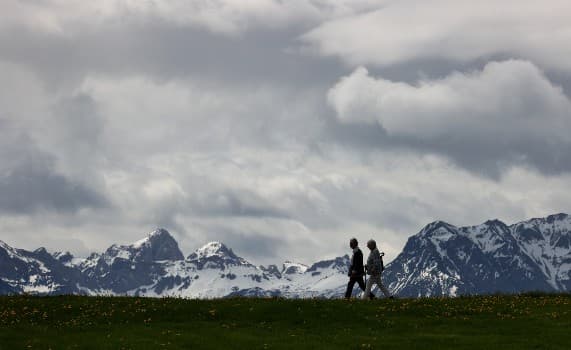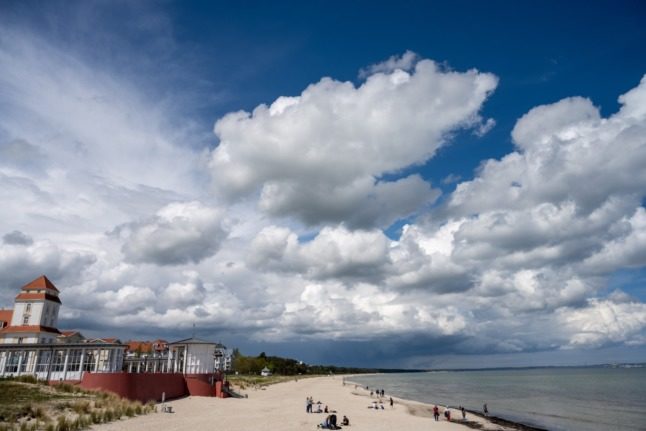Which German holiday hotspots are opening up for Pentecost?

Various German states have plans to open back up their tourists sectors over the coming Pentecost holiday, also known as Whitsun. Here's a look at what is possible where.
The coming weekend includes an extra day off on Monday thanks to the Christian holiday of Pentecost. Many people will be hoping for a break after months cooped up at home.
With the rate of infection now much lower than a month ago many districts and cities have already ended the tight 'emergency brake' restrictions that included curfews (although they are still in place in some parts of the country).
So although some areas in Germany are beginning to open up, keep in mind that - somewhat confusingly - the federal government continues to urge people to "avoid all non-essential professional and private travel, especially tourist travel at home and abroad".
For an idea of how things are developing, here is a run down of the current picture in states that are most popular among holidaymakers.
Note that there could be special restrictions depending on the region. So if you're planning a trip somewhere else, check the local rules and ask the hotel or holiday home company you're visiting if there's anything else you should know.
READ ALSO: Explained – Germany’s new relaxed quarantine and testing rules for travel
Bavaria
The southern state, famous for its Alpine walks, is set to open much of its tourist sector this weekend.
Starting on Friday, vacation homes, youth hostels and campsites in districts with a 7-day incidence below 100 cases per 100,000 inhabitants will be allowed to open back up again.
"We want to make tourism possible in hotels, vacation homes and apartments over Pentecost," Bavarian leader Markus Söder has confirmed.
At the weekend cable cars will start taking people back up into the mountains, while boat trips will start up again on the state's scenic lakes. City tours will all be possible on the proviso that guests can provide a negative Covid test.
SEE ALSO: What does UK’s new travel advice for Europe’s ‘amber’ countries mean?
Baden-Württemberg
Hotels in the southwestern state can open in districts that have lifted the emergency brake, i.e. have had an incidence under 100 on five consecutive days.
Outdoor cinemas, theatres and converts can also start offering events in districts with incidences below 100.
Berlin
The tighter emergency brake measures, including the curfew, are lifted in Berlin on May 19th as the capital has managed to keep cases below 100 infections per 100,000 residents for five days in a row.
Outdoor dining at restaurants in Berlin opens from May 21st with restrictions, including providing a negative Covid test result (or proof of being fully vaccinated or recovered from Covid-19). Outdoor swimming pools, cinemas and cultural venues are also allowed to open on Friday with restrictions.
Berlin is also set to reopen hotels and guest houses again on June 4th if the 7-day incidence continues to stay below 100.
Brandenburg
Going on holiday in the rural state that surrounds Berlin is only possible if the district has had an incidence under 100 for the past five days. While the whole state has breached the 100 mark, not all districts have done it in time for Pentecost.
It is possible to stay in holiday homes or at camp sites, but camping is only possible if you have your own toilet i.e. you have a big fancy mobile home.
Up to two households can eat together in the outdoor areas of restaurants but only if they can provide a negative rapid Covid test or show that they have been fully vaccinated or have tested positive for a SARS-Cov-2 infection in the past 6 months.
Lower Saxony
Holiday lets and hotels have already been allowed to open in the rural northern state, which has a popular North Sea coastline. Originally this was just allowed for state residents, but a regional court on Tuesday ruled that tourism could again reopen for everyone, under strict testing requirements and caps on the number of guests.
North Rhine-Westphalia
In the populous western state, hotels and guest houses are allowed to open at 60 percent of their capacity in districts with a 7-day incidence below 100. If the incidence drops below 50 then they can go back to normal capacity.
Likewise restaurants are allowed to open for outdoor dining under an incidence of 100 and to open fully at an incidence below 50.
Mecklenburg-Western Pomerania

The island of Rügen in Mecklenburg. credit: dpa | Stefan Sauer
The northeastern state is being more cautious than other popular tourist destinations.
Restaurants will be allowed to open starting on Sunday May 23rd, but holiday lets will open on June 7th and then only for residents of the state. A week later, on June 14th, other Germans will be allowed to holiday in the northeast.
SEE ALSO: 10 of the best summer activities you can still enjoy under Covid rules in Germany
Saxony
The eastern state is allowing people to stay in holiday homes and at campgrounds below a 7-day incidence of 100 and for hotels to accept guests blow an incidence of 50. Outdoor dining also reopened on Wednesday to guests with a negative test.
Schleswig-Holstein
The northern state with coast lines on the North and Baltic Seas has gone furthest in opening up for tourists from the whole country, something that started on Monday.
The state has the lowest infection rate in the country and restaurants - including indoor areas - and holiday lets are both now allowed to open.
People arriving from outside the state have to be able to provide a negative test and then test themselves every three days once they have entered.
Comments
See Also
The coming weekend includes an extra day off on Monday thanks to the Christian holiday of Pentecost. Many people will be hoping for a break after months cooped up at home.
With the rate of infection now much lower than a month ago many districts and cities have already ended the tight 'emergency brake' restrictions that included curfews (although they are still in place in some parts of the country).
So although some areas in Germany are beginning to open up, keep in mind that - somewhat confusingly - the federal government continues to urge people to "avoid all non-essential professional and private travel, especially tourist travel at home and abroad".
For an idea of how things are developing, here is a run down of the current picture in states that are most popular among holidaymakers.
Note that there could be special restrictions depending on the region. So if you're planning a trip somewhere else, check the local rules and ask the hotel or holiday home company you're visiting if there's anything else you should know.
READ ALSO: Explained – Germany’s new relaxed quarantine and testing rules for travel
Bavaria
The southern state, famous for its Alpine walks, is set to open much of its tourist sector this weekend.
Starting on Friday, vacation homes, youth hostels and campsites in districts with a 7-day incidence below 100 cases per 100,000 inhabitants will be allowed to open back up again.
"We want to make tourism possible in hotels, vacation homes and apartments over Pentecost," Bavarian leader Markus Söder has confirmed.
At the weekend cable cars will start taking people back up into the mountains, while boat trips will start up again on the state's scenic lakes. City tours will all be possible on the proviso that guests can provide a negative Covid test.
SEE ALSO: What does UK’s new travel advice for Europe’s ‘amber’ countries mean?
Baden-Württemberg
Hotels in the southwestern state can open in districts that have lifted the emergency brake, i.e. have had an incidence under 100 on five consecutive days.
Outdoor cinemas, theatres and converts can also start offering events in districts with incidences below 100.
Berlin
The tighter emergency brake measures, including the curfew, are lifted in Berlin on May 19th as the capital has managed to keep cases below 100 infections per 100,000 residents for five days in a row.
Outdoor dining at restaurants in Berlin opens from May 21st with restrictions, including providing a negative Covid test result (or proof of being fully vaccinated or recovered from Covid-19). Outdoor swimming pools, cinemas and cultural venues are also allowed to open on Friday with restrictions.
Berlin is also set to reopen hotels and guest houses again on June 4th if the 7-day incidence continues to stay below 100.
Brandenburg
Going on holiday in the rural state that surrounds Berlin is only possible if the district has had an incidence under 100 for the past five days. While the whole state has breached the 100 mark, not all districts have done it in time for Pentecost.
It is possible to stay in holiday homes or at camp sites, but camping is only possible if you have your own toilet i.e. you have a big fancy mobile home.
Up to two households can eat together in the outdoor areas of restaurants but only if they can provide a negative rapid Covid test or show that they have been fully vaccinated or have tested positive for a SARS-Cov-2 infection in the past 6 months.
Lower Saxony
Holiday lets and hotels have already been allowed to open in the rural northern state, which has a popular North Sea coastline. Originally this was just allowed for state residents, but a regional court on Tuesday ruled that tourism could again reopen for everyone, under strict testing requirements and caps on the number of guests.
North Rhine-Westphalia
In the populous western state, hotels and guest houses are allowed to open at 60 percent of their capacity in districts with a 7-day incidence below 100. If the incidence drops below 50 then they can go back to normal capacity.
Likewise restaurants are allowed to open for outdoor dining under an incidence of 100 and to open fully at an incidence below 50.
Mecklenburg-Western Pomerania

The island of Rügen in Mecklenburg. credit: dpa | Stefan Sauer
The northeastern state is being more cautious than other popular tourist destinations.
Restaurants will be allowed to open starting on Sunday May 23rd, but holiday lets will open on June 7th and then only for residents of the state. A week later, on June 14th, other Germans will be allowed to holiday in the northeast.
SEE ALSO: 10 of the best summer activities you can still enjoy under Covid rules in Germany
Saxony
The eastern state is allowing people to stay in holiday homes and at campgrounds below a 7-day incidence of 100 and for hotels to accept guests blow an incidence of 50. Outdoor dining also reopened on Wednesday to guests with a negative test.
Schleswig-Holstein
The northern state with coast lines on the North and Baltic Seas has gone furthest in opening up for tourists from the whole country, something that started on Monday.
The state has the lowest infection rate in the country and restaurants - including indoor areas - and holiday lets are both now allowed to open.
People arriving from outside the state have to be able to provide a negative test and then test themselves every three days once they have entered.
Join the conversation in our comments section below. Share your own views and experience and if you have a question or suggestion for our journalists then email us at [email protected].
Please keep comments civil, constructive and on topic – and make sure to read our terms of use before getting involved.
Please log in here to leave a comment.